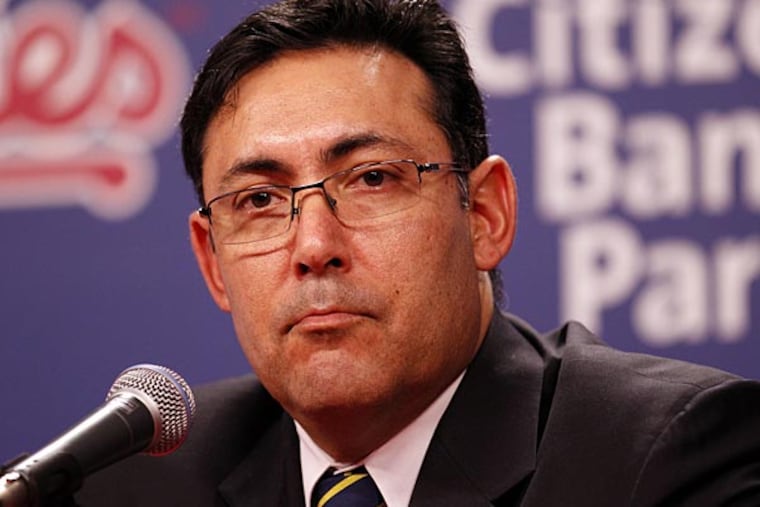Amaro gets backing from his boss
The barking on David Montgomery's doorstep has started again. It was never louder than when Ed Wade was the Phillies' general manager. Starving for the postseason, the fan base wanted a change and loudly voiced that opinion over a number of disappointing seasons. Wade was finally fired by Montgomery and replaced by Pat Gillick after the 2005 season.

The barking on David Montgomery's doorstep has started again.
It was never louder than when Ed Wade was the Phillies' general manager. Starving for the postseason, the fan base wanted a change and loudly voiced that opinion over a number of disappointing seasons. Wade was finally fired by Montgomery and replaced by Pat Gillick after the 2005 season.
Eight years later, with general manager Ruben Amaro Jr. overseeing a team that is struggling below .500, the voices of discontent are growing once again.
Montgomery, the Phillies' president and the only man with an opinion on Amaro that matters, defended his general manager Wednesday.
"The reality is that when things don't go well, people look to find, well, whose fault is it?" Montgomery said. "I believe in situations like this that when times are good there's enough credit to go around. It's all of us. Ruben is not making independent decisions. He's going with a pretty good group of eyes who are looking out there at players and making determinations. God knows we're all trying to bat 1.000 on decision making. The reality is, I think we do better than the .300 standard in baseball."
Amaro's list of baseball assistants is long, ranging from special assistants Gillick, Dallas Green, Charley Kerfeld and Bart Braun to three assistant general managers - Benny Looper, Scott Proefrock and Marti Wolever - to director of player development Joe Jordan and director of professional scouting Mike Ondo. Wade is also back as a special consultant, and scouts Dave Hollins, Howie Freiling and Gordon Lakey play a role as well.
The general manager typically makes the final decision, and Amaro's four most significant moves of the offseason were the trades for third baseman Michael Young and centerfielder Ben Revere, plus the free-agent signings of pitcher Mike Adams and rightfielder Delmon Young. He also signed free-agent reliever Chad Durbin, who has since been released.
"In Ben Revere, we have a 24-year-old player . . . whose big component is speed and the ability to steal bases," Montgomery said. "When you acquire somebody like that, you hope that Ben becomes maybe a long-term element of this club. God knows, when we sent Shane Victorino down after his first spring . . . we offered him back [to the Dodgers], they didn't want him back and lo and behold he's the International League player of the year. He becomes a fixture in our outfield."
As for Adams, he said the Phillies still believe he will become the dominant setup man they thought they were getting when they signed him to a two-year deal worth $12 million.
"Maybe he's not capable of being the pitcher he was, but we still believe he is," Montgomery said. "The way [Jonathan Papelbon] has covered the end of the game, if Mike Adams is a lockdown guy in the eighth inning, then the rest of the [bullpen] group gets auditioned in a far less pressure situation than they've been pitching in."
Montgomery said this is a difficult time for Amaro and his staff because the Phillies are an organization in transition.
"We came into this season with more than one or two needs," he said. "In recent years, we had really been fortunate. We were able to say, 'We could use an outfielder or we could use somebody to replace Pedro Feliz at third.' The canvas has gotten a little bit broader. You add to that the uncertainty of the health and it has made the equation a little bit tougher."